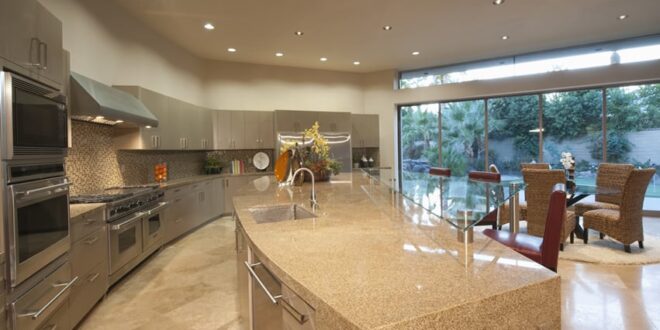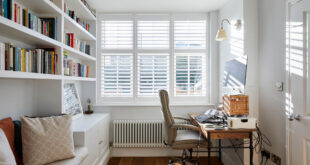The Allure of the Waterfall Island Kitchen: More Than Just a Trend
The waterfall island kitchen. Just the name conjures images of sleek, modern spaces where form and function meet in perfect harmony. But what exactly is a waterfall island, and why has it become such a sought-after feature in contemporary kitchen design? Let’s dive deep into the world of waterfall islands, exploring their aesthetic appeal, practical benefits, material options, design considerations, and everything else you need to know to determine if a waterfall island is right for your kitchen.
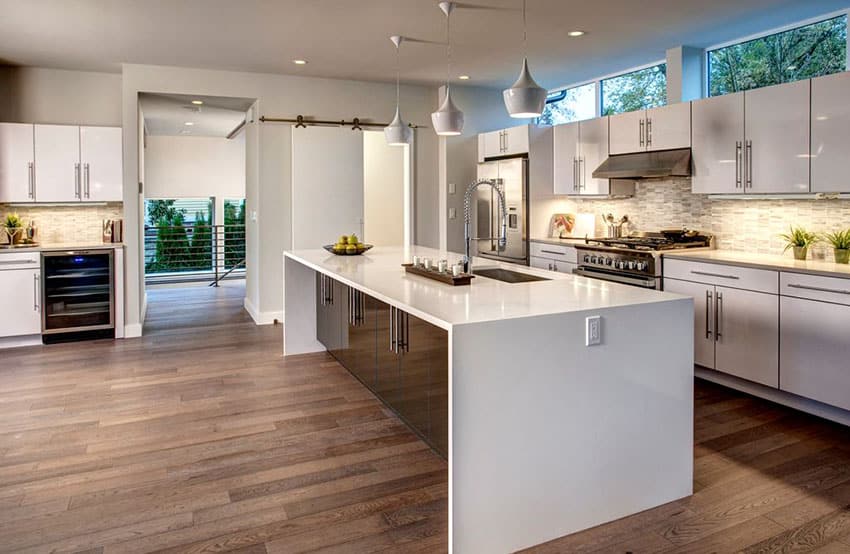
At its core, a waterfall island is a kitchen island where the countertop material extends vertically down the sides, reaching the floor. This creates a continuous, cascading effect, visually resembling a waterfall. This seamless transition from horizontal to vertical surfaces offers a clean, minimalist look that adds a touch of sophistication to any kitchen.</p
The rising popularity isn’t accidental. It’s a confluence of factors: a growing appreciation for clean lines and minimalist design, a desire for kitchens that are both functional and visually stunning, and advancements in materials and fabrication techniques that make creating waterfall islands more accessible than ever before. Think of it as taking the elegance of a continuous surface and amplifying it, making it a focal point of the entire kitchen. It’s not just an island; it’s a statement.</p
Why Choose a Waterfall Island? The Benefits Unveiled
Beyond the undeniable aesthetic appeal, waterfall islands offer a range of practical and functional benefits that make them a worthwhile investment for any homeowner. Let’s explore some of the key advantages:
Enhanced Aesthetic Appeal
This is the most obvious benefit. Waterfall islands exude a sense of luxury and sophistication. The continuous flow of the countertop material creates a visually stunning focal point that elevates the entire kitchen design. It screams modern elegance without being overly flashy. It’s a subtle but powerful design choice.
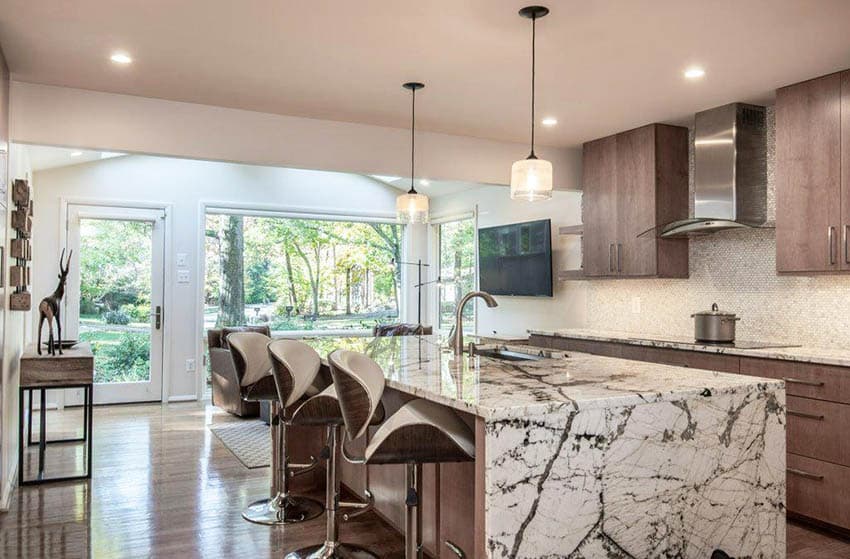
Protection and Durability
The extended countertop material offers added protection to the island’s cabinetry. This is particularly beneficial in high-traffic areas where accidental bumps and scrapes are common. The waterfall edge acts as a shield, preventing damage and prolonging the life of your island.
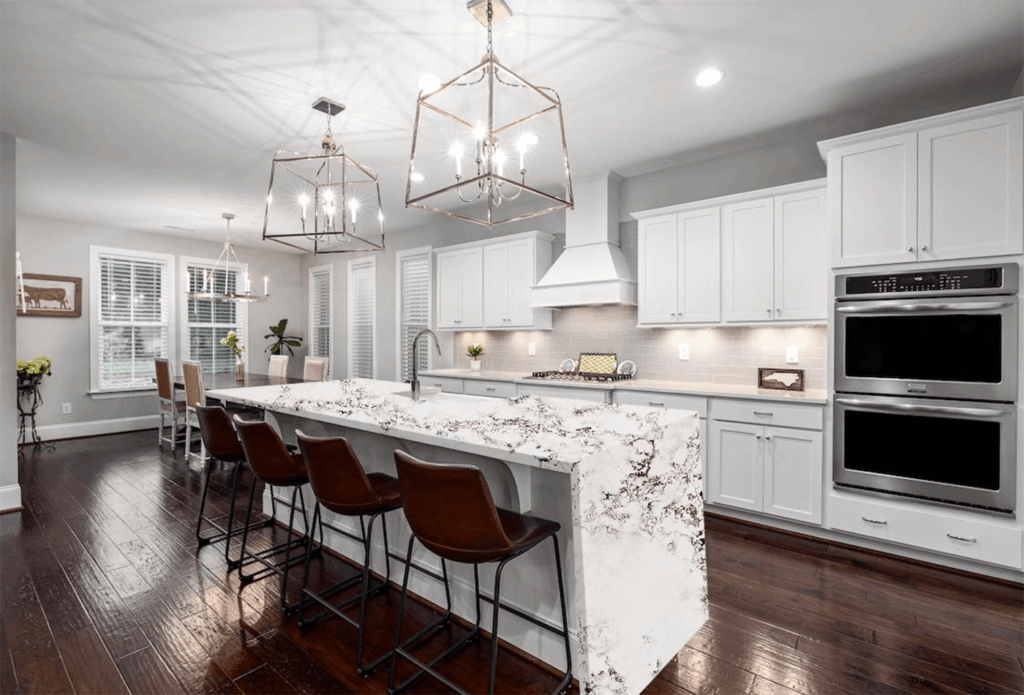
Concealing Imperfections
If your island’s cabinetry has any imperfections or visible joints, a waterfall edge can effectively conceal them. The continuous surface hides these flaws, creating a cleaner and more polished look. This is especially useful if you’re retrofitting an existing island with a waterfall edge.
Creating a Sense of Flow
The seamless transition from horizontal to vertical surfaces creates a sense of flow and continuity in the kitchen. This can visually expand the space and make it feel more open and airy. It blends the island into the rest of the design seamlessly, offering a harmonious visual experience.
Increased Resale Value
A well-designed kitchen is a major selling point for any home. A waterfall island adds a touch of luxury and sophistication that can increase your home’s resale value. It’s a design feature that buyers often find appealing.
Versatility in Design
Waterfall islands are incredibly versatile and can be adapted to suit a wide range of kitchen styles, from modern and minimalist to transitional and even traditional. The key is to choose the right materials and design elements to complement your overall aesthetic.
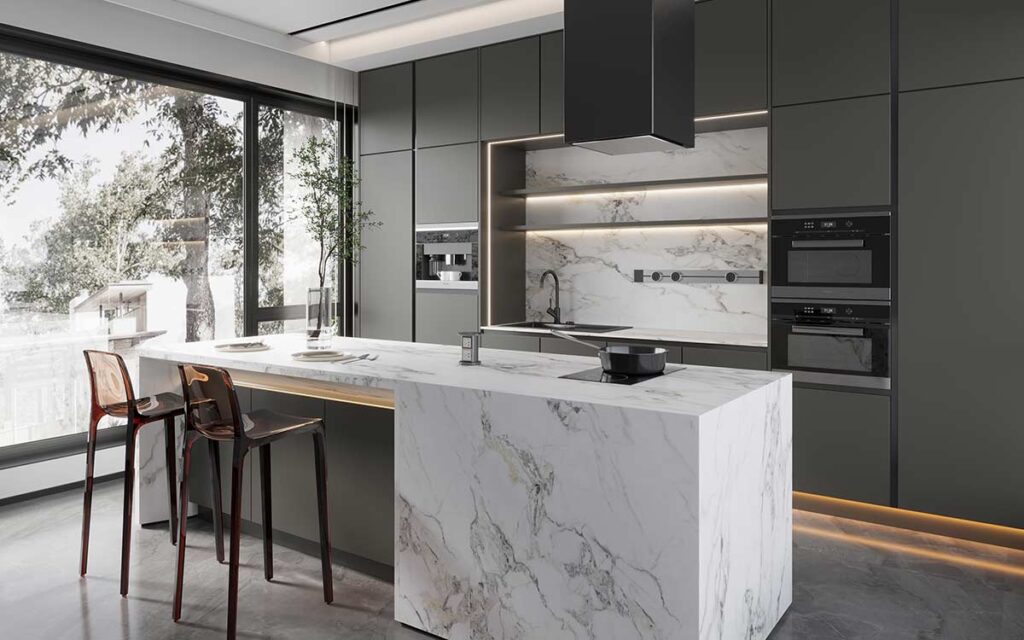
Material Matters: Selecting the Perfect Countertop for Your Waterfall Island
The choice of countertop material is crucial for the success of your waterfall island. It will not only affect the overall aesthetic but also the durability, maintenance, and cost of the island. Here’s a rundown of some of the most popular material options:
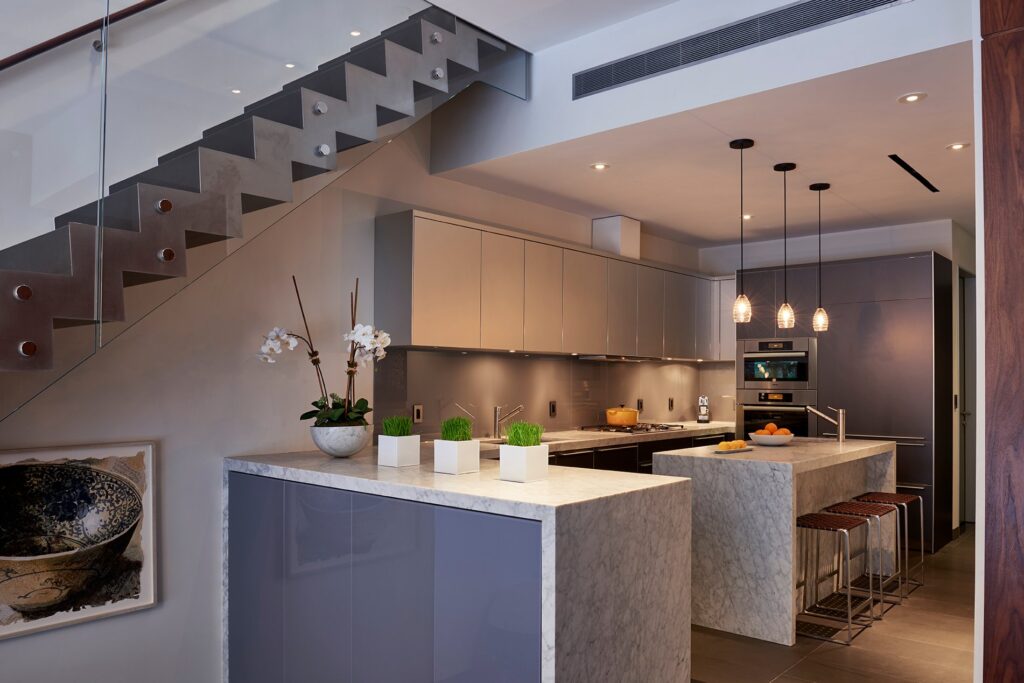
Quartz: The Versatile and Durable Choice
Quartz is an engineered stone made from crushed quartz crystals and resin. It’s a highly durable, non-porous, and stain-resistant material that’s perfect for busy kitchens. Quartz is available in a wide range of colors and patterns, mimicking the look of natural stone but with added consistency and durability.
Pros:
- Highly durable and scratch-resistant
- Non-porous and stain-resistant
- Low maintenance
- Wide range of colors and patterns
- Consistent appearance
Cons:
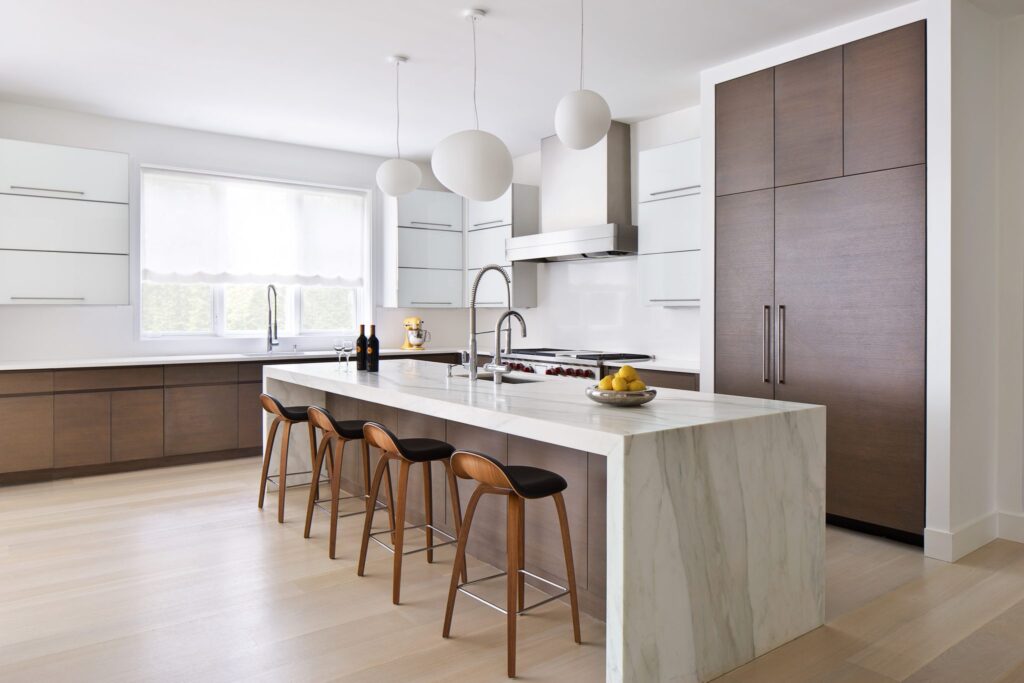
- Can be more expensive than some other options
- Not as heat-resistant as some natural stones
- The manufactured look may not appeal to everyone
Granite: The Timeless and Natural Option
Granite is a natural stone known for its durability, heat resistance, and unique veining patterns. Each granite slab is unique, making it a beautiful and one-of-a-kind addition to any kitchen. However, granite is porous and requires sealing to prevent staining.
Pros:
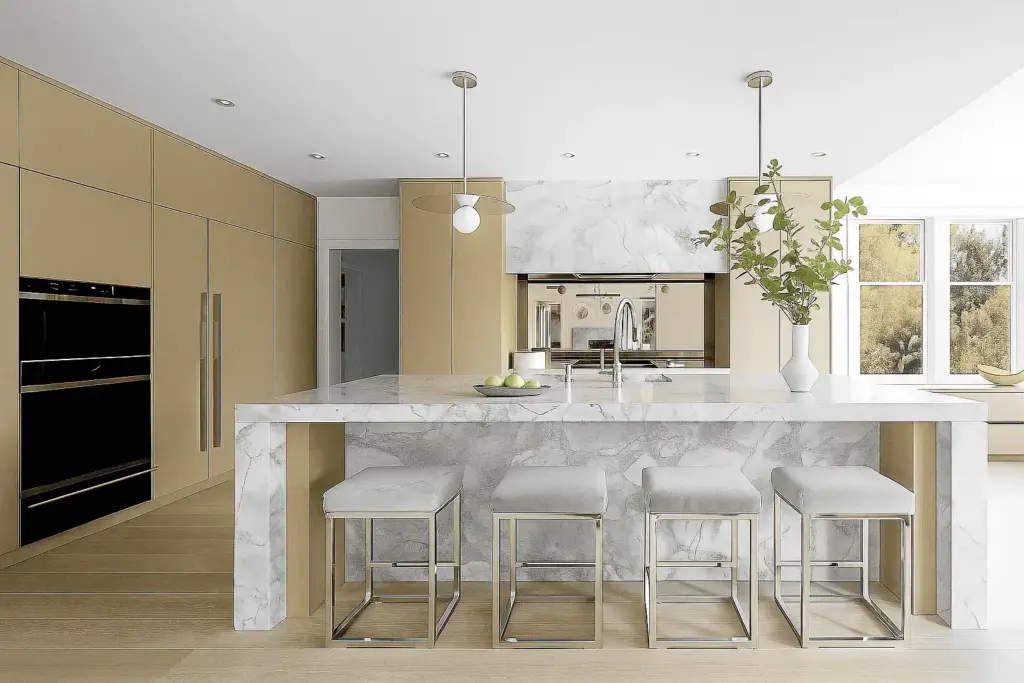
- Highly durable and heat-resistant
- Unique and natural appearance
- Adds value to your home
Cons:
- Porous and requires sealing
- Can be expensive
- Limited color and pattern options compared to quartz
- Can be susceptible to chipping or cracking
Marble: The Luxurious and Elegant Choice
Marble is a natural stone known for its luxurious appearance and elegant veining. It’s a softer stone than granite or quartz and is more prone to scratching and staining. However, its beauty is undeniable, and it can add a touch of sophistication to any kitchen.
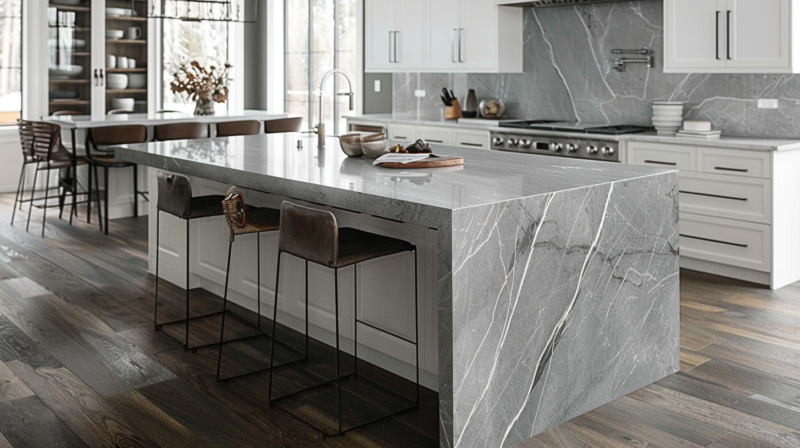
Pros:
- Luxurious and elegant appearance
- Unique and beautiful veining
Cons:
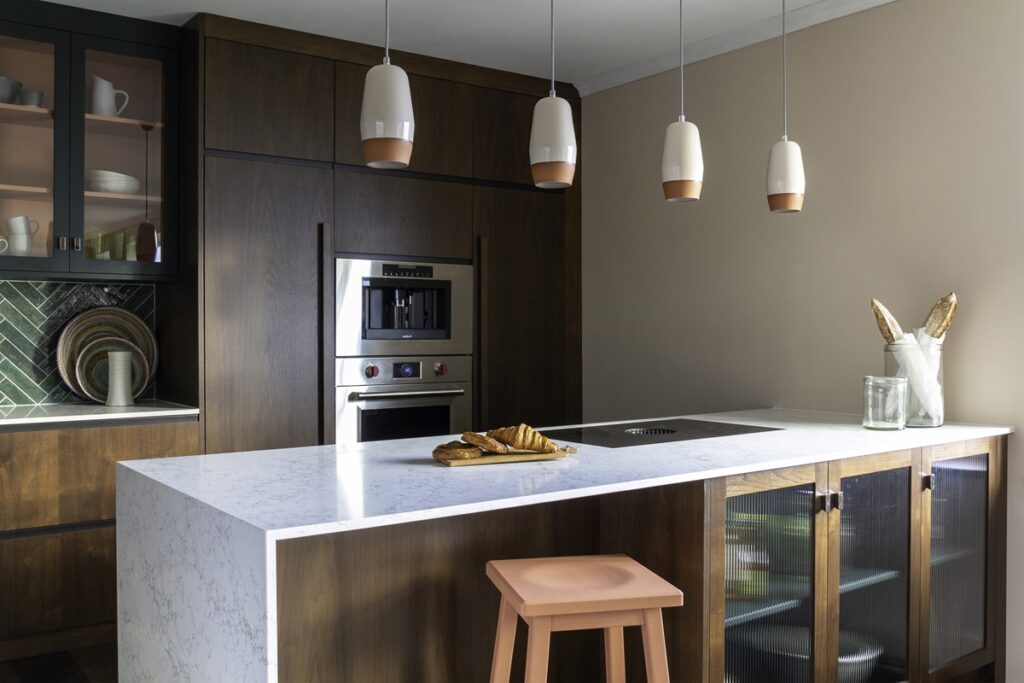
- Soft and prone to scratching and staining
- Requires regular sealing
- Can be very expensive
- Not as durable as granite or quartz
Solid Surface: The Seamless and Affordable Option
Solid surface materials, such as Corian, are non-porous and seamless, making them easy to clean and maintain. They are available in a wide range of colors and patterns and can be molded into custom shapes. However, they are not as heat-resistant or durable as quartz or granite.
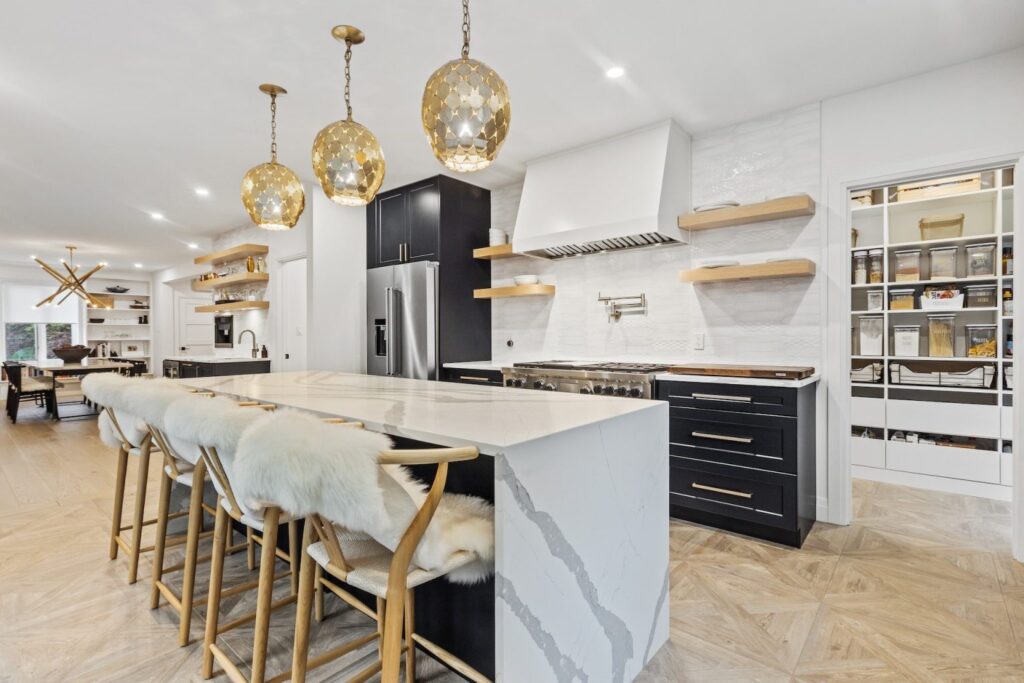
Pros:
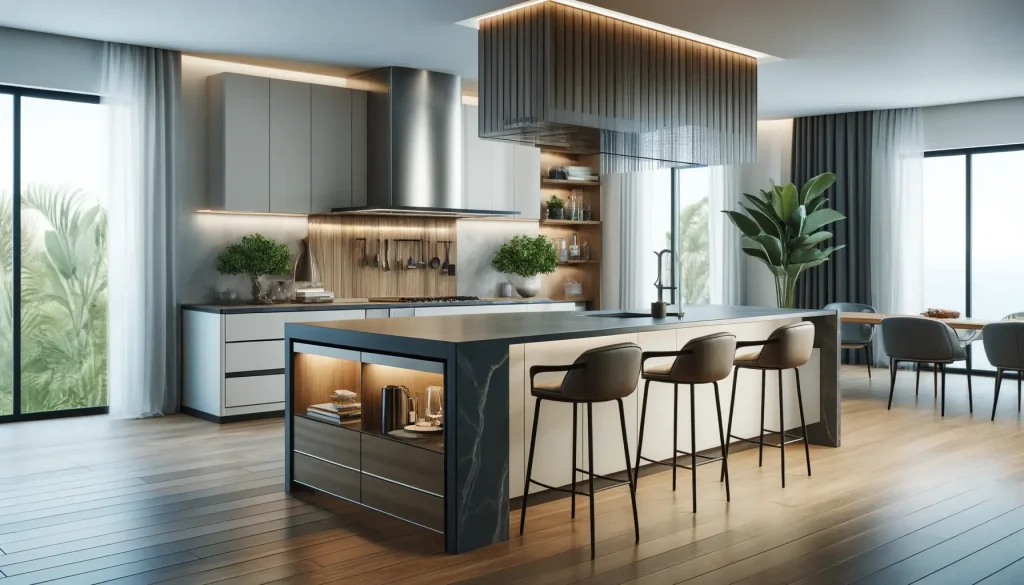
- Seamless and non-porous
- Easy to clean and maintain
- Wide range of colors and patterns
- Can be molded into custom shapes
- More affordable than natural stone
Cons:
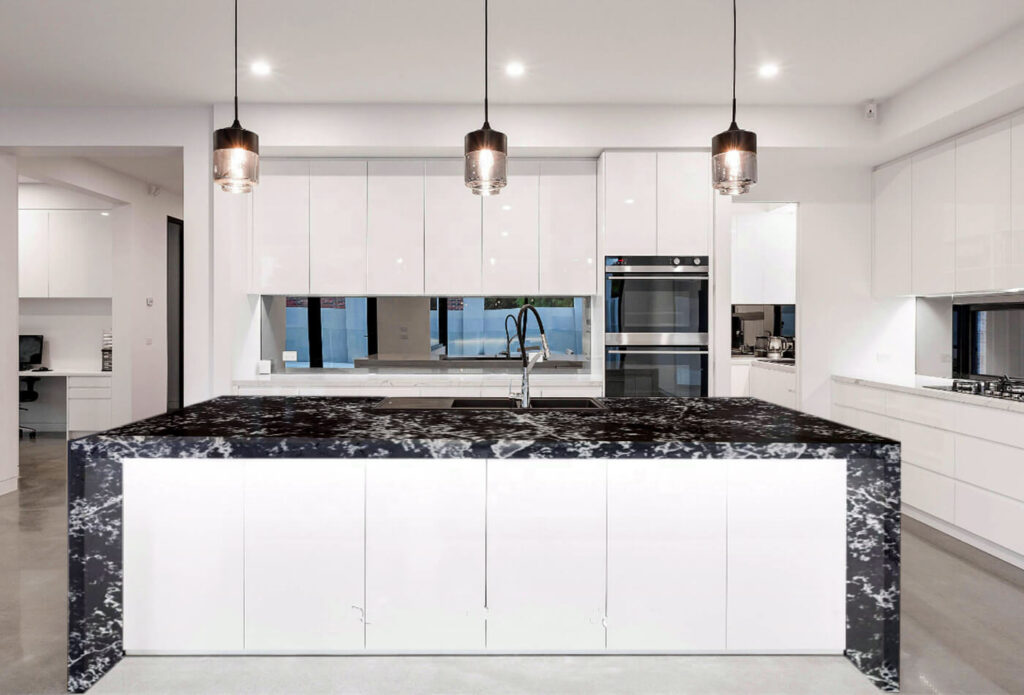
- Not as heat-resistant or durable as quartz or granite
- Can be scratched or dented
- May not have the same high-end look as natural stone
Wood: The Warm and Rustic Option
A wood waterfall island brings warmth and rustic charm to your kitchen. It can be crafted from various wood species, each offering its unique grain and color. However, wood is susceptible to moisture damage and requires regular sealing and maintenance.
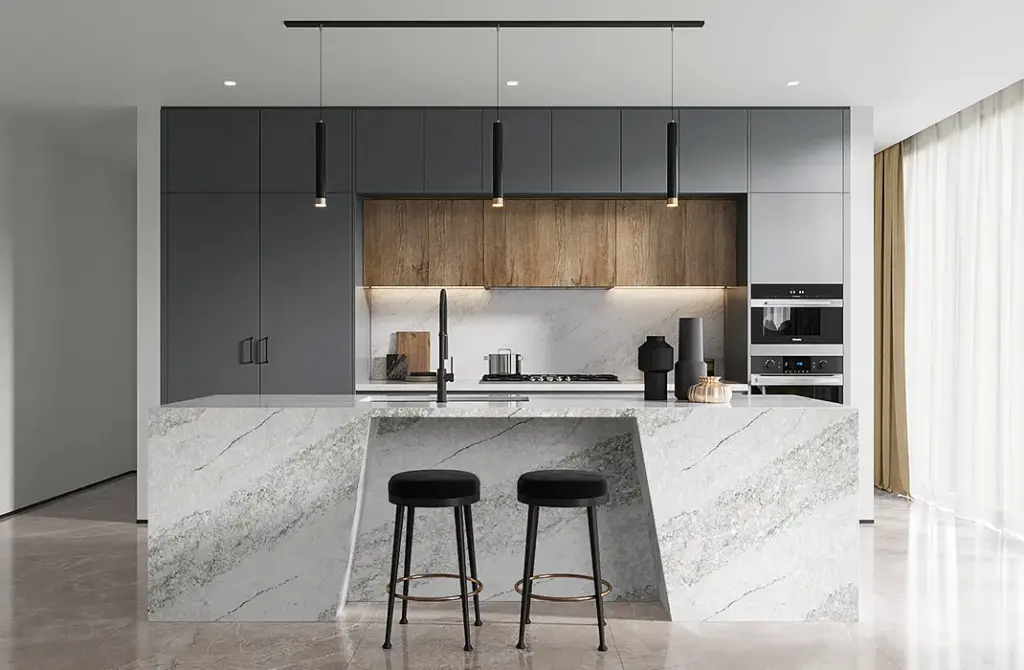
Pros:
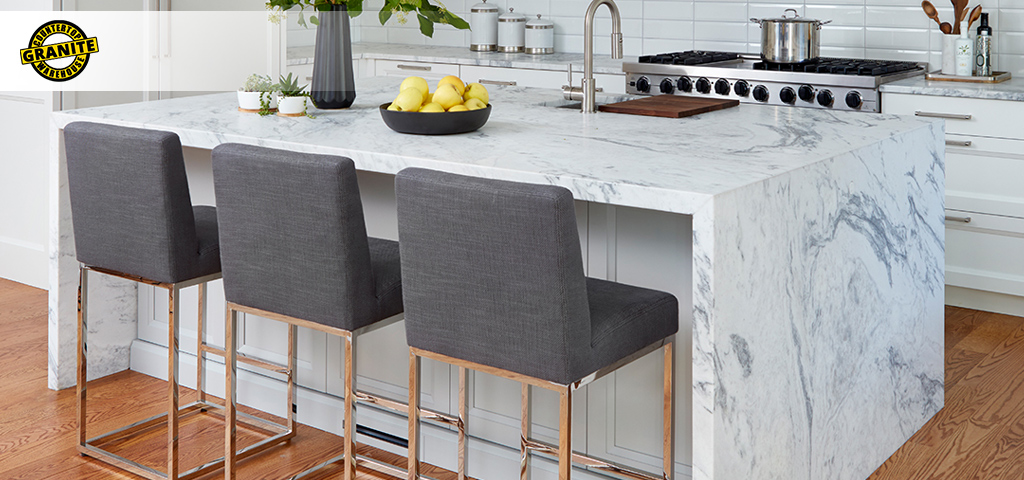
- Warm and inviting aesthetic
- Adds a natural element to the kitchen
- Can be customized with different wood species and finishes
Cons:
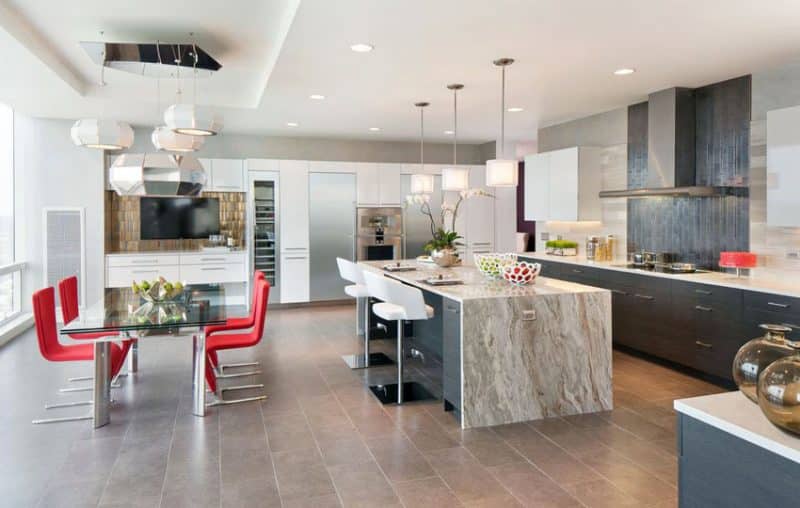
- Susceptible to moisture damage
- Requires regular sealing and maintenance
- Not as durable as stone or engineered materials
- Can be prone to scratches and dents
Concrete: The Industrial and Modern Option
Concrete waterfall islands offer a raw, industrial aesthetic that’s perfect for modern kitchens. Concrete is incredibly durable and can be customized with different colors and textures. However, it’s also porous and requires sealing to prevent staining.
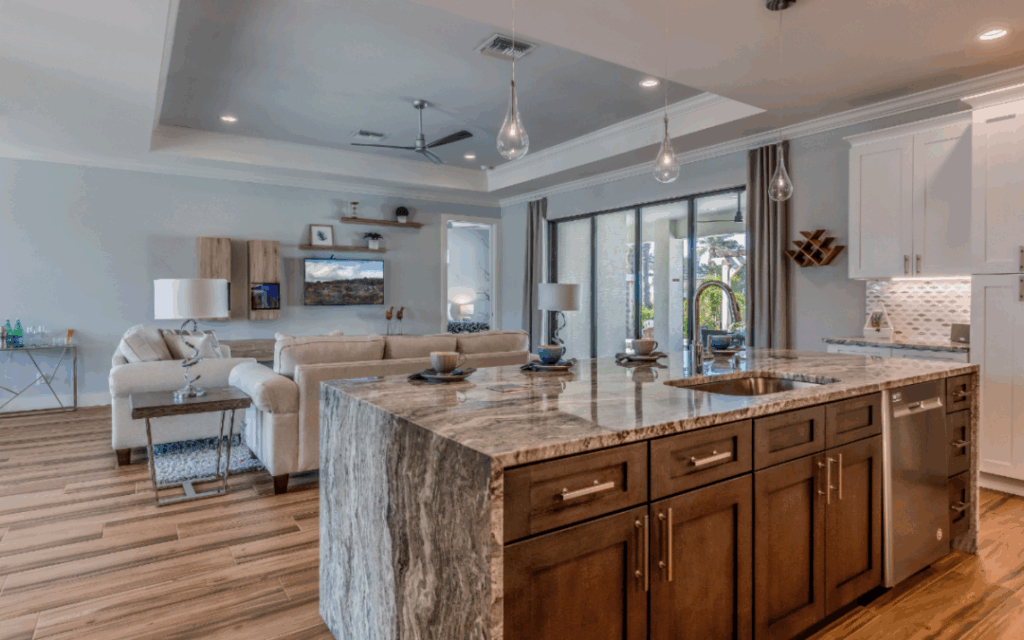
Pros:
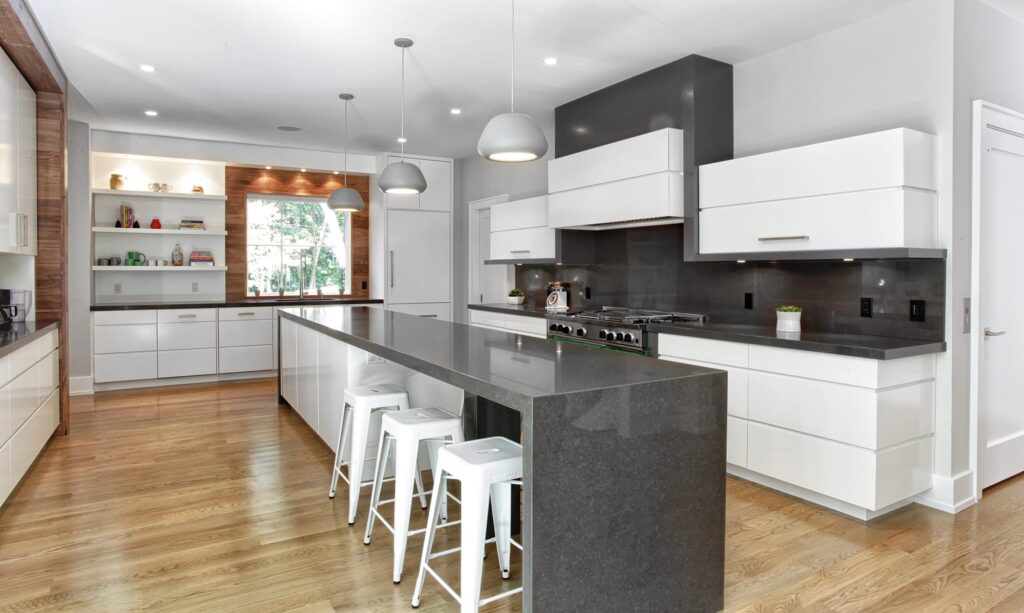
- Unique and industrial aesthetic
- Highly durable
- Can be customized with different colors and textures
Cons:
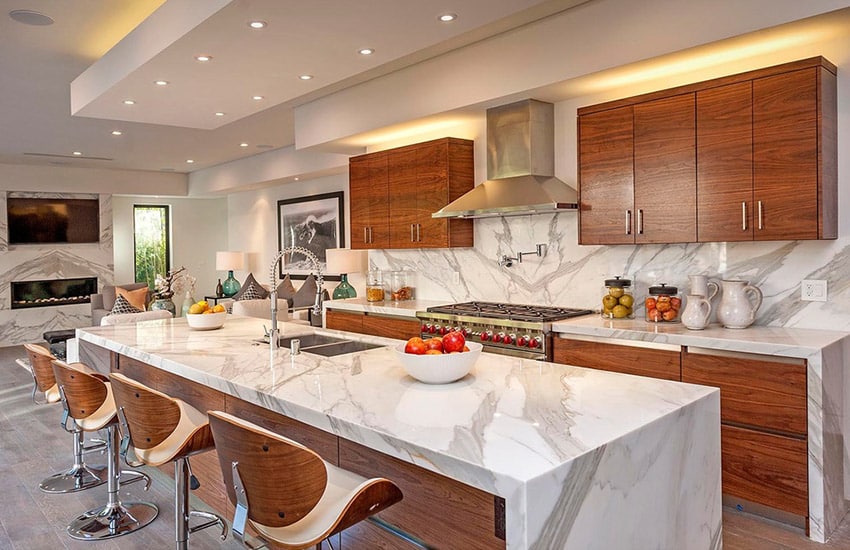
- Porous and requires sealing
- Can be prone to cracking
- Heavy and difficult to install
- May not appeal to everyone
Porcelain Slab: The Thin and Durable Option
Porcelain slabs are gaining popularity for their durability, lightweight, and realistic stone look. They are non-porous, resistant to scratches, stains, and heat, making them an excellent choice for a waterfall island.
Pros:
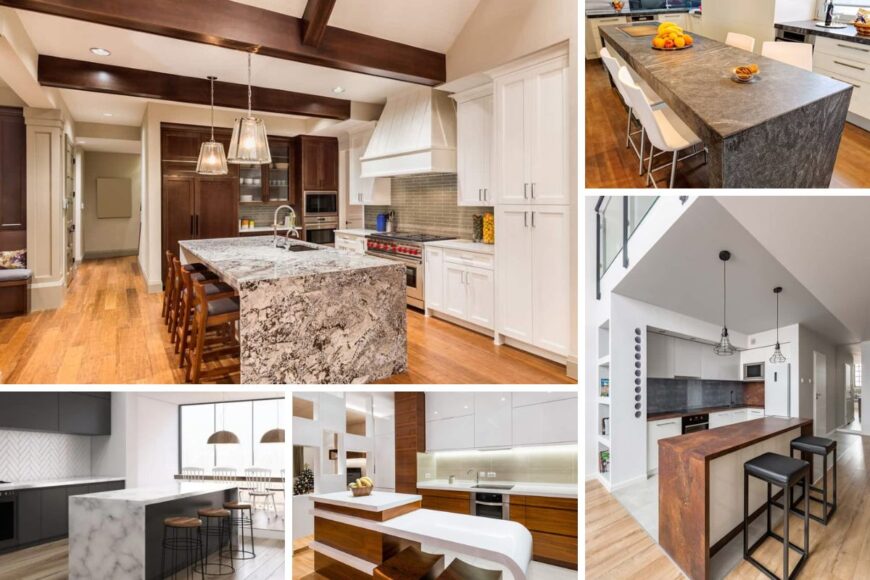
- Highly durable and resistant to scratches, stains, and heat
- Non-porous and easy to clean
- Lightweight and easy to install
- Available in a wide range of colors and patterns
Cons:
- Can be expensive
- Requires professional installation
- Edges can be prone to chipping
Design Considerations: Planning Your Perfect Waterfall Island
Designing a waterfall island requires careful planning and consideration of several factors. Here are some key design considerations to keep in mind:
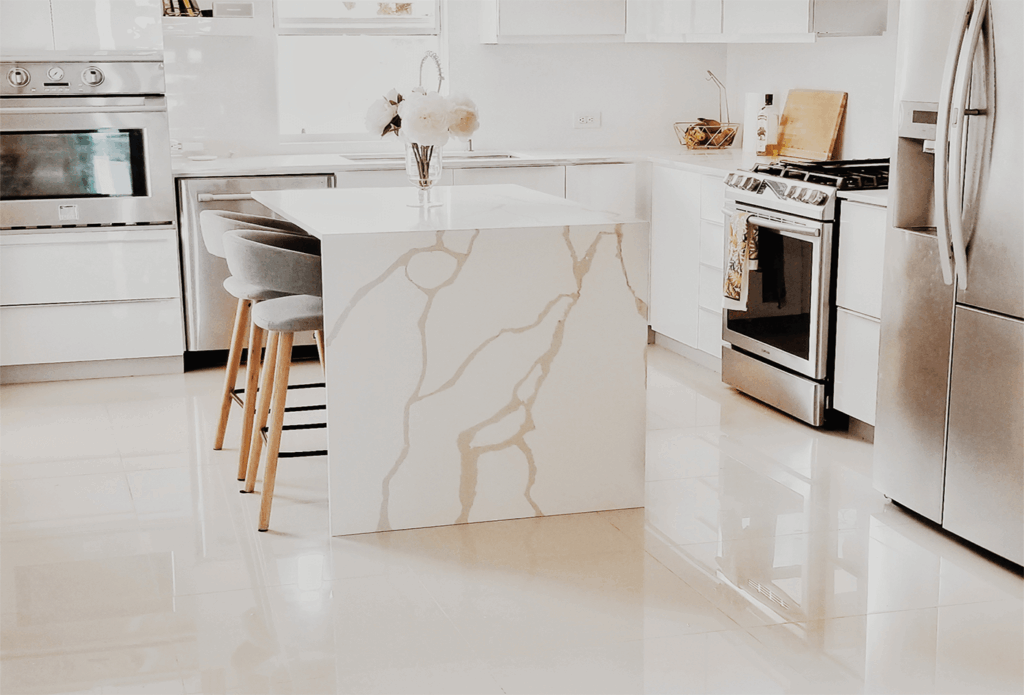
Island Size and Proportion
The size and proportion of your island should be in scale with the overall size of your kitchen. A large island in a small kitchen can feel overwhelming, while a small island in a large kitchen can get lost. Consider the available space and traffic flow when determining the dimensions of your island.
Island Shape and Layout
Waterfall islands can be designed in various shapes, including rectangular, square, L-shaped, and even curved. The shape of your island should complement the overall layout of your kitchen and your specific needs. Consider incorporating features such as seating, storage, and a prep sink.
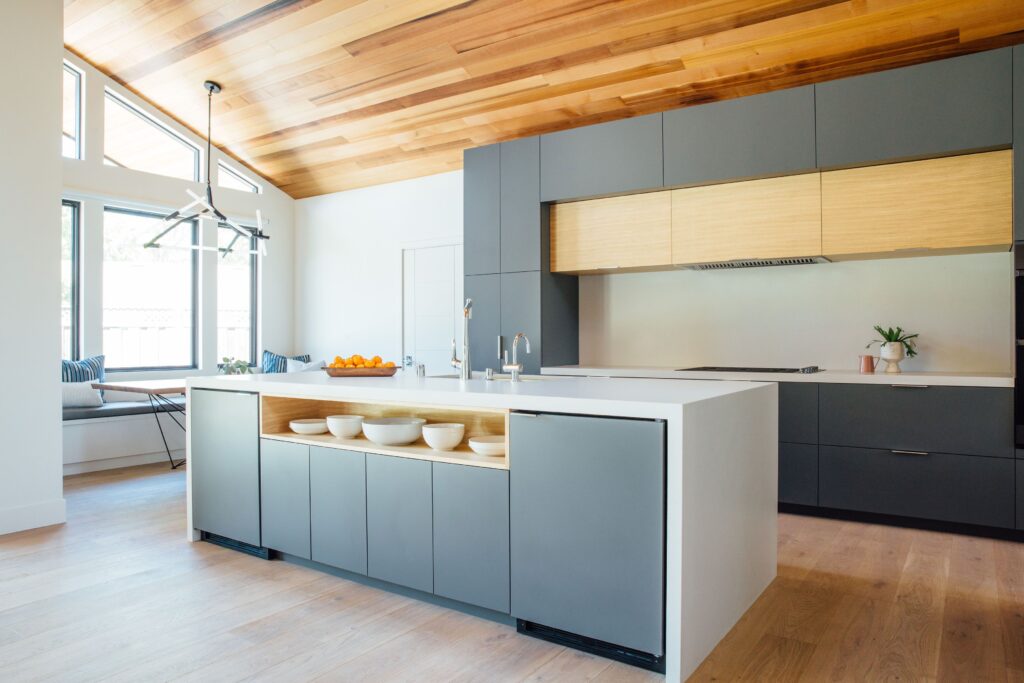
Waterfall Edge Thickness
The thickness of the waterfall edge can significantly impact the overall look of your island. A thicker edge creates a more substantial and dramatic look, while a thinner edge offers a more streamlined and minimalist aesthetic. Choose a thickness that complements your chosen material and overall design style.
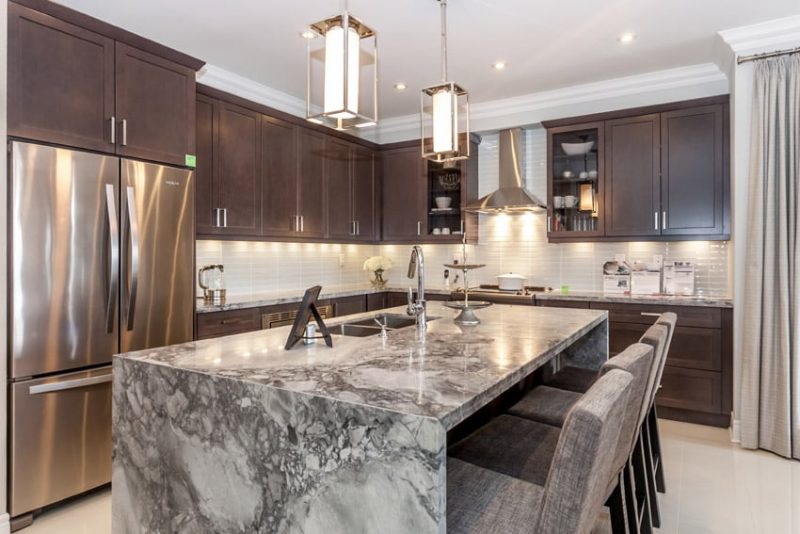
Cabinetry and Storage
Consider the storage needs of your kitchen when designing your island. Incorporate drawers, cabinets, and shelving to maximize storage space. Consider adding pull-out shelves, spice racks, and other organizational features to make your island more functional.
Seating and Functionality
If you plan to use your island for seating, consider the height and placement of the stools or chairs. Ensure that there is enough legroom and counter space for comfortable seating. Consider adding an overhang to the countertop to create a more comfortable seating area.
Lighting
Proper lighting is essential for any kitchen island. Consider incorporating pendant lights, recessed lights, or under-cabinet lighting to illuminate the island and create a warm and inviting atmosphere. Task lighting is also important for food preparation and other activities.
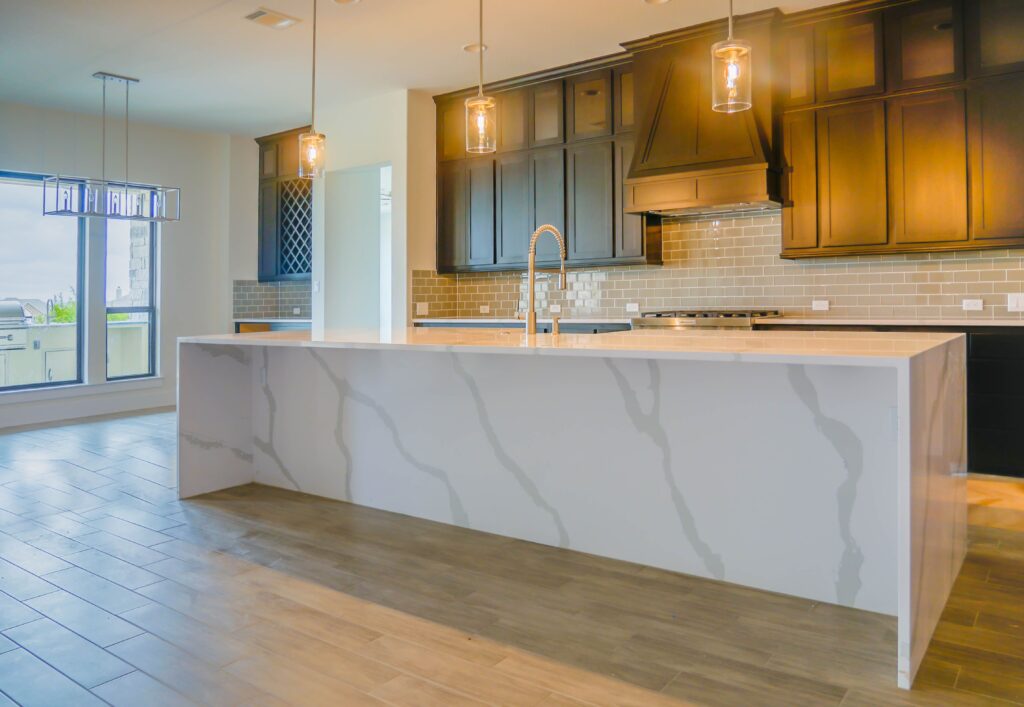
Plumbing and Electrical
If you plan to incorporate a sink or cooktop into your island, you’ll need to consider plumbing and electrical requirements. Ensure that you have the necessary outlets and plumbing connections in place before installing the island. Consult with a qualified electrician and plumber to ensure that all work is done safely and according to code.
Contrast and Complementary Materials
Consider using contrasting materials for the island countertop and cabinetry to create visual interest. For example, you could pair a light-colored countertop with dark cabinetry or vice versa. You can also use complementary materials to create a more cohesive look. For example, you could use the same countertop material for the island and the perimeter countertops.
Waterfall Island Styles: Finding Your Perfect Match
Waterfall islands are incredibly versatile and can be adapted to suit a wide range of kitchen styles. Here are some popular waterfall island styles:
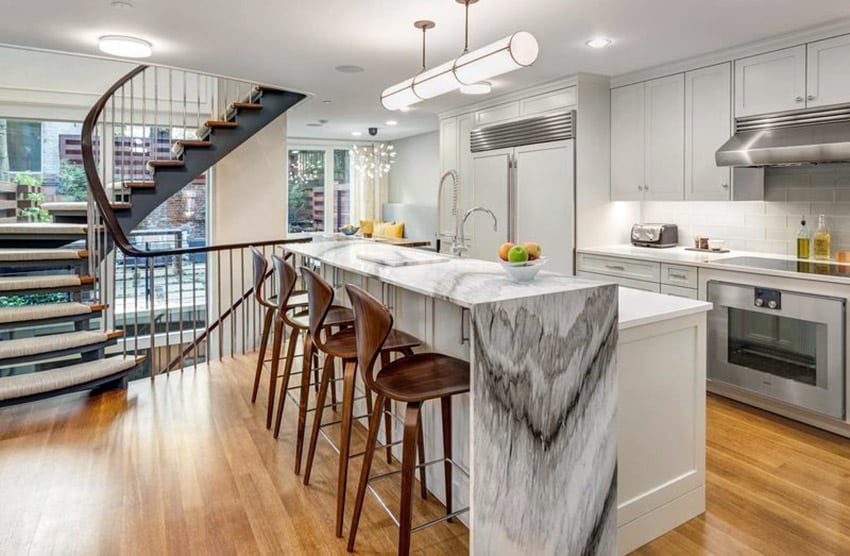
Modern and Minimalist
Modern waterfall islands typically feature clean lines, simple shapes, and a minimalist aesthetic. They often incorporate materials such as quartz, stainless steel, and glass. The focus is on functionality and simplicity.
Transitional
Transitional waterfall islands blend traditional and modern elements to create a timeless and elegant look. They often incorporate materials such as granite, marble, and wood. The focus is on creating a comfortable and inviting space.
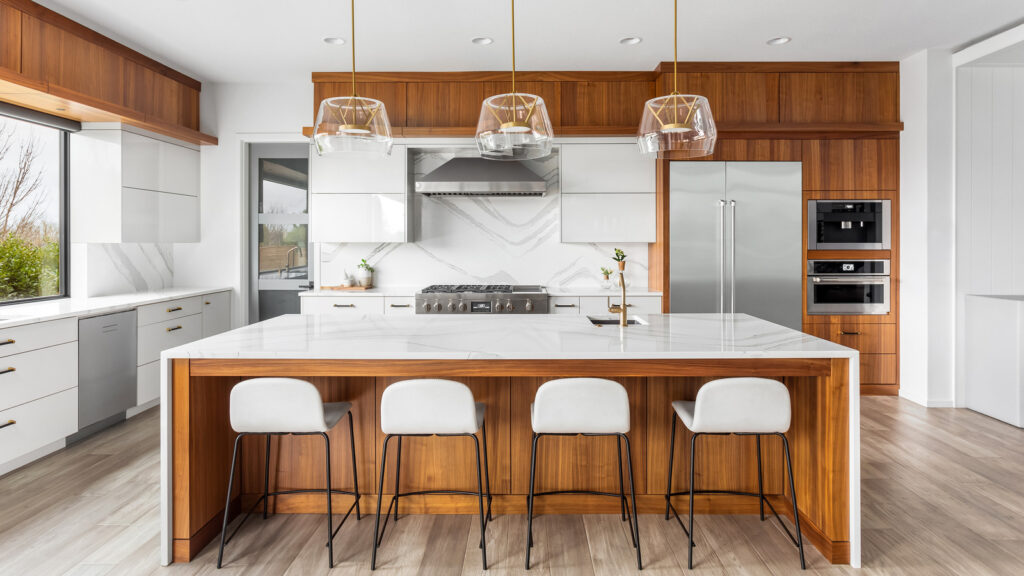
Contemporary
Contemporary waterfall islands are characterized by their bold designs, unique materials, and innovative features. They often incorporate materials such as concrete, porcelain, and reclaimed wood. The focus is on creating a unique and eye-catching space.
Farmhouse
Farmhouse waterfall islands bring a touch of rustic charm to the kitchen. They often incorporate materials such as wood, reclaimed wood, and natural stone. The focus is on creating a warm and inviting space.
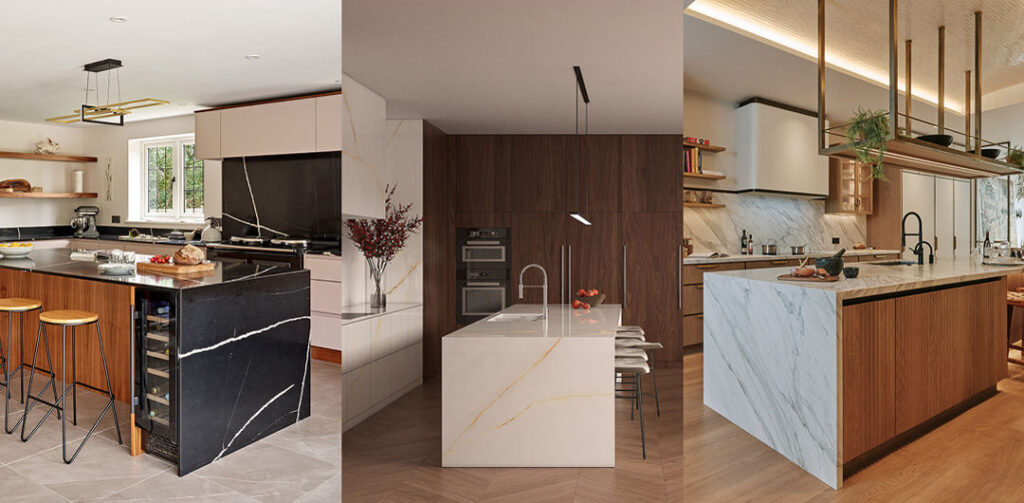
Industrial
Industrial waterfall islands embrace a raw and unfinished aesthetic. They often incorporate materials such as concrete, metal, and brick. The focus is on creating a functional and durable space.
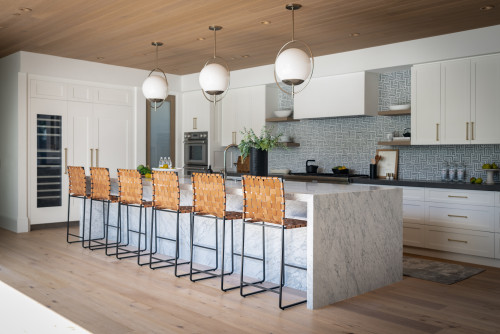
Installation and Maintenance: Ensuring Longevity
Proper installation and maintenance are crucial for ensuring the longevity and beauty of your waterfall island. Here are some tips to keep in mind:
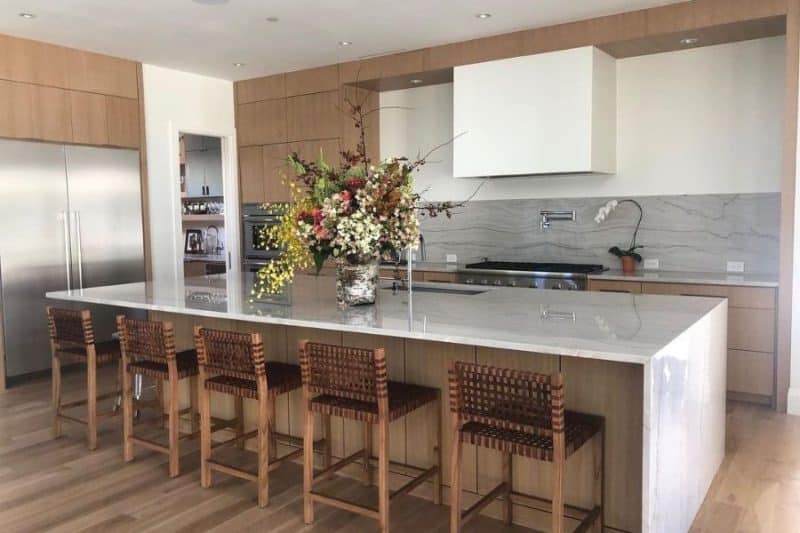
Professional Installation
Installing a waterfall island is a complex process that requires specialized skills and knowledge. It’s best to hire a professional contractor to ensure that the island is installed correctly and safely. A professional installer will have the necessary tools and experience to handle the job properly.
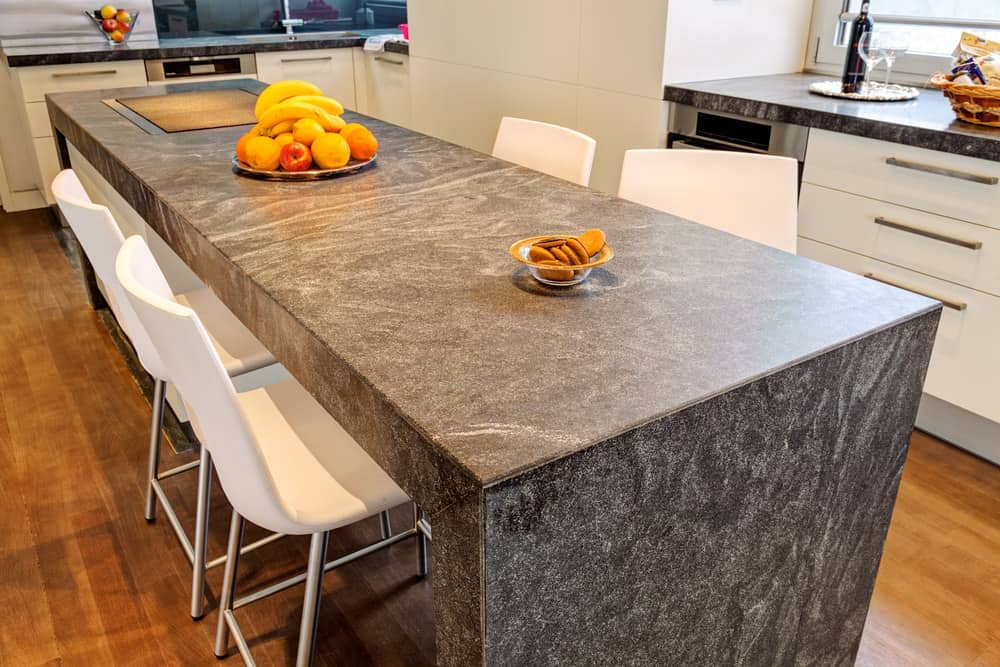
Sealing
Natural stone countertops, such as granite and marble, require regular sealing to prevent staining. Follow the manufacturer’s instructions for sealing your countertop. Generally, sealing should be done every 6-12 months.
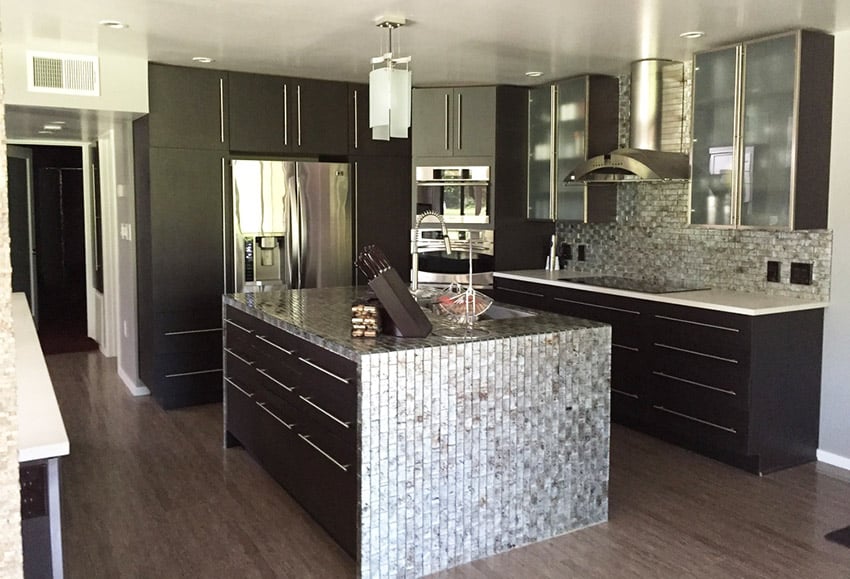
Cleaning
Clean your waterfall island regularly with a mild soap and water solution. Avoid using harsh chemicals or abrasive cleaners, as they can damage the countertop material. Wipe up spills immediately to prevent staining.
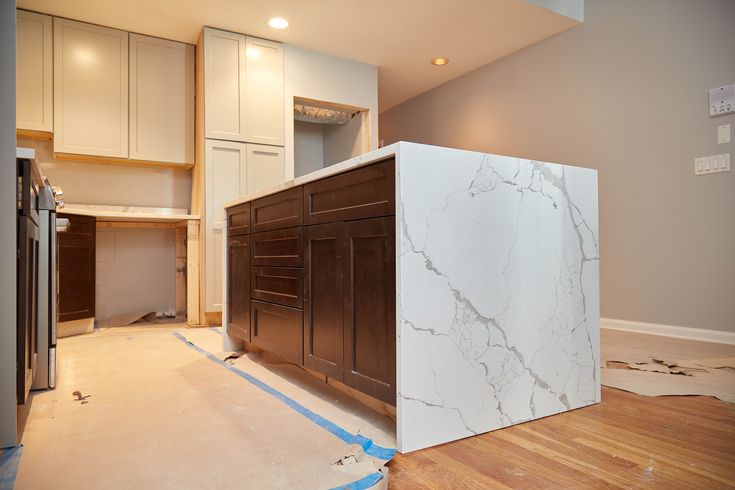
Protection
Protect your countertop from scratches and heat by using cutting boards, trivets, and coasters. Avoid placing hot pots and pans directly on the countertop. Use placemats under dishes to prevent scratches.
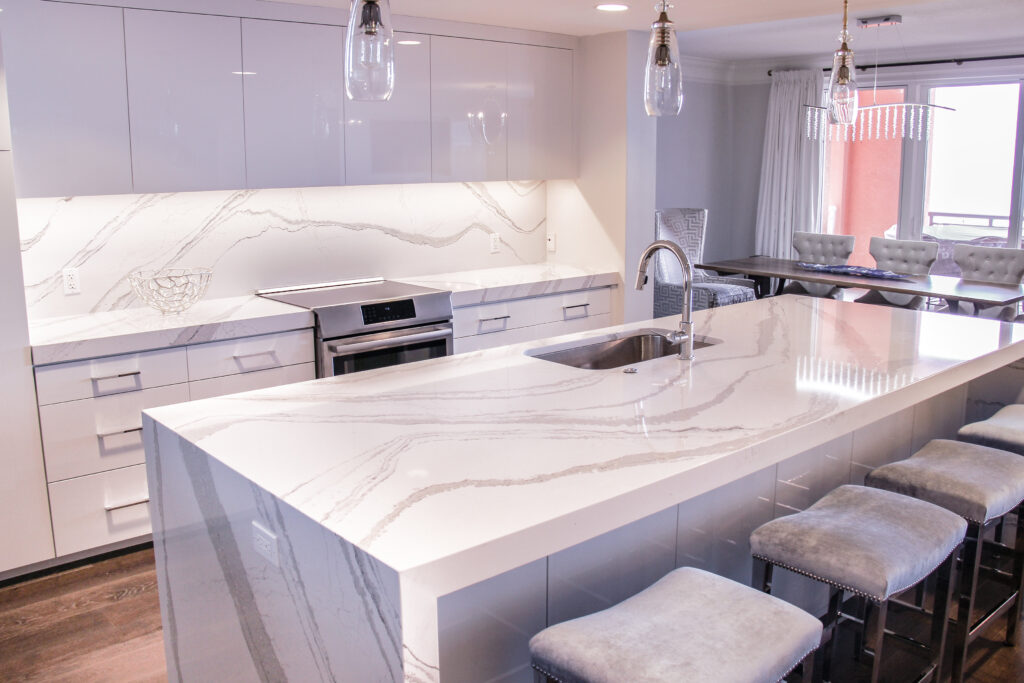
Repair
If your countertop is damaged, consult with a professional repair technician. Minor chips and scratches can often be repaired with epoxy or other fillers. More significant damage may require replacement of the countertop.
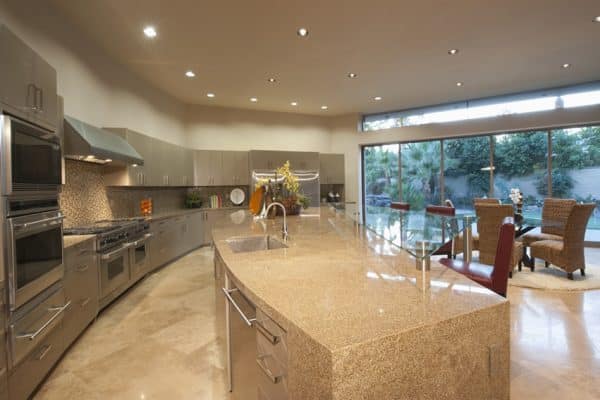
Cost Considerations: Budgeting for Your Waterfall Island
The cost of a waterfall island can vary depending on the size, materials, and complexity of the design. Here are some factors that will affect the cost:
- Countertop Material: Natural stone, such as marble and granite, are generally more expensive than engineered materials, such as quartz and solid surface.
- Island Size and Shape: Larger and more complex islands will typically cost more than smaller and simpler islands.
- Cabinetry: The type and quality of the cabinetry will also affect the cost. Custom cabinetry will generally cost more than stock cabinetry.
- Installation: Professional installation can add a significant cost to the project.
- Plumbing and Electrical: If you plan to incorporate a sink or cooktop into your island, you’ll need to factor in the cost of plumbing and electrical work.
To get an accurate estimate of the cost of your waterfall island, it’s best to consult with a professional contractor and get multiple quotes. Don’t be afraid to shop around and compare prices.
Waterfall Island Kitchen: A Worthwhile Investment?
A waterfall island kitchen represents more than just a design choice; it’s an investment in your home, lifestyle, and aesthetic sensibilities. While the cost might be higher compared to a standard island, the benefits—enhanced aesthetic appeal, durability, functionality, and potential increase in resale value—often outweigh the initial investment.
Ultimately, the decision of whether to incorporate a waterfall island into your kitchen depends on your individual needs, preferences, and budget. However, if you’re looking to create a stunning and functional kitchen that will stand the test of time, a waterfall island is definitely worth considering. It’s a statement piece that blends seamlessly with modern living, adding value and character to the heart of your home.
 Nimila
Nimila
